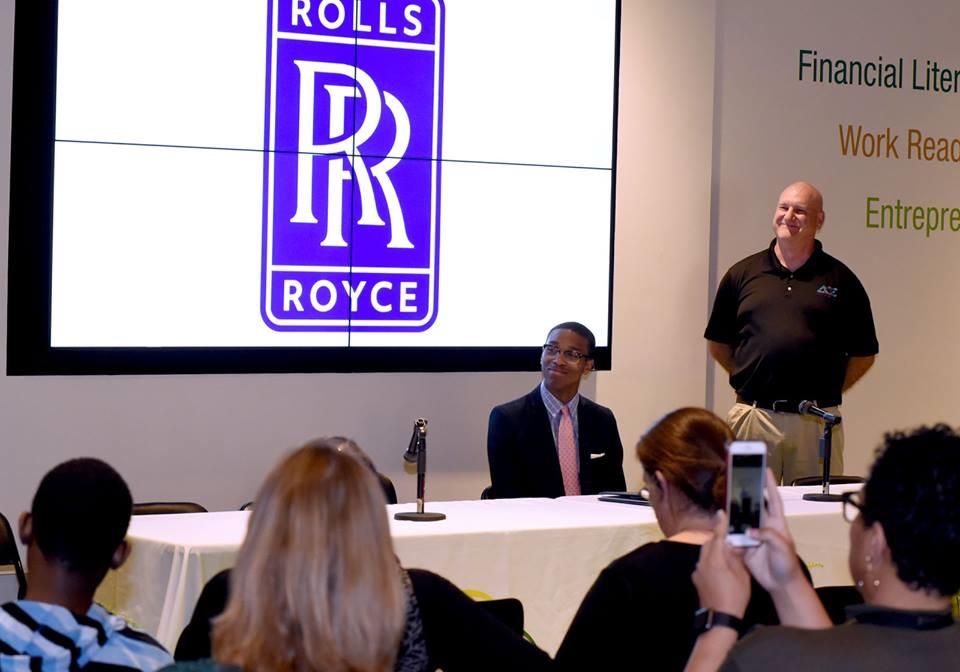Sr. Digital Editor
- FMA
- The Fabricator
- FABTECH
- Canadian Metalworking
Categories
- Additive Manufacturing
- Aluminum Welding
- Arc Welding
- Assembly and Joining
- Automation and Robotics
- Bending and Forming
- Consumables
- Cutting and Weld Prep
- Electric Vehicles
- En Español
- Finishing
- Hydroforming
- Laser Cutting
- Laser Welding
- Machining
- Manufacturing Software
- Materials Handling
- Metals/Materials
- Oxyfuel Cutting
- Plasma Cutting
- Power Tools
- Punching and Other Holemaking
- Roll Forming
- Safety
- Sawing
- Shearing
- Shop Management
- Testing and Measuring
- Tube and Pipe Fabrication
- Tube and Pipe Production
- Waterjet Cutting
Industry Directory
Webcasts
Podcasts
FAB 40
Advertise
Subscribe
Account Login
Search
Growing popularity of career signing days goes nationwide
Virginia school district puts spotlight on college loan debt crisis, students being career-ready in manufacturing and other fields after high school
- By Gareth Sleger
- June 12, 2019
When Mac Beaton came up with the concept of a career signing day, he had no idea the impact the event would have on students outside of Henrico County, Va.
The idea hatched more than a year ago. While overhearing high school seniors discuss their post-graduation plans in the halls between classes, Beaton couldn’t help but notice an annoying trend. Students who said they were headed into the workforce rather than college or the military would say, “Well, I’m just going to work.”
This didn’t sit well with Beaton, Director of Career and Technical Education (CTE) at Henrico County Public Schools (HCPS)
“It’s like going to work was less than,” Beaton said. “It drove me crazy.”
Then while sitting through one of many athletic scholarship signing days and seeing all the fanfare that came with it, Beaton had a realization. “Why don’t we do something like this for students that are going into the workforce?”
Just like every school district across the U.S., HCPS has events for students signing collegiate academic scholarships and for those headed into the military. But HCPS also has a very well-respected and established career development program in CTE, which includes paths for everything from manufacturing to metalworking to construction to cosmetology. It has survived rounds of educational budget cuts, including one a decade ago when many similar programs were dropped from school districts around the country due to the economic recession.
"I am very fortunate to be in Henrico," said Beaton. “Our county as a whole made a commitment to CTE and held strong during that time. Our county values workforce development because without that, the county itself is not going to move forward."
Beaton wanted to quantify the value of the career-focused decision for not only the students, but also for the parents and the business community. “Basically, let’s celebrate this choice,” said Beaton.
So that’s what he and the school district did. And in March 2018, Beaton and CTE held the very first career signing day, now officially known as Letter of Intent Signing Day, for a little more than a dozen of the program’s students.
The event drew the attention of local media, but then Mike Rowe of “Dirty Jobs” fame caught wind, causing a national media exposure that Beaton never could have anticipated. When Rowe praised the event on his Facebook page, Beaton and CTE’s students found themselves in the spotlight of the “Today” show, Fox News, and other news outlets.

Noah McLaughlin-Cooley signed a letter of intent to work for the Rolls-Royce North America manufacturing center in Prince George County, Va. Through the Henrico County Public School Career and Technical Education program, McLaughlin-Cooley completed training in precision machining, including welding, shop safety management, and other metal fabrication skills.
“The impact has been absolutely phenomenal,” said Beaton. “This isn’t just getting them ready for a job, it’s setting a career path.”
Soon after Beaton was inundated with phone calls not only from businesses in the Henrico County area, but also from hundreds of other U.S. school districts wanting to implement a similar event of their own.
“I have been contacted by just about every state in the country and even some from Canada,” said Beaton, who estimates that after the 2018 signing day, he took between 300 and 400 phone calls from other schools.
“This is not just about Henrico County or the students in Henrico County. This is about celebrating our future as a country. Without the future workforce, we're dead in the water.”
The buzz around Henrico County was also overwhelming. Following last year’s event, hundreds more students signed up for CTE and dozens upon dozens more area businesses wanted to partner with the school district – to the point where Beaton started having to turn people away.
“At the beginning of the school year, we will have an appreciation dinner for our business partners that we've worked with and have hired our young people,” Beaton said. “We would normally have 20 to 30 business partners. This year when I put the application and dinner announcement out, I had to cut it off 24 hours later because we already had 177 businesses signed up. We've got more jobs waiting for students right now than we actually have students.”
That’s saying something. This year’s CTE signing day, which was held April 23 and live-streamed on CTE’s website, featured more than 110 seniors signing letters of intent to work for 60 Henrico County-area businesses, including some students entering the metal fabrication sector with the area’s Rolls-Royce North America center, which manufactures aircraft components and turbine blades.
And of the nearly 400 school districts that contacted Beaton, more than 100 held their own career signing day this spring, including the School District of Palm Beach County in Florida, Frederick County Public Schools in Maryland, and the Orange-Ulster BOCES school district extension in New York, to name just a few.
Going to Work vs. Going to College
With high school and college graduation season behind us, the celebrations and parties fade back to the glaring reminder of college debt. And as the mounting financial strife grows with the cost of higher education, more and more soon-to-be high school graduates ask themselves if college is worth drowning debt that comes with a degree.
According to the most recent study from the National Student Clearinghouse Research Center, higher education enrollment has decreased for the eighth consecutive year in 2019 with 2 percent fewer students enrolled in colleges and universities this spring compared to 2018.
“Colleges and universities in many regions continue to struggle from the combined effects of a strong job market and smaller numbers of high school graduates,” said Doug Shapiro, Executive Director of the National Student Clearinghouse Research Center. “Growth in the numbers of graduate and professional students has not been large enough to make up for the declines in undergraduates in recent years."
The Brookings Institute shows that, since 2000, the number of college students graduating with more than $50,000 in debt has more than tripled, and they are also taking more time to pay back those loans.
“I think the economy is driving people to realize that going to college is a great thing if that's what they should be doing,” Beaton said. “But, if not, there are other options besides college.”
Programs like CTE are trying to get ahead of the education debt dilemma. By exposing high school students to different career opportunities, these programs help weigh the benefits of going to work against college after high school.
“I used to ask kids all the time what they plan on doing when they graduate,” Beaton said. “Most of them would say they were going to college because that's the expected answer. So I dig a little deeper and ask what they were majoring in. A lot of them didn't know. And then you'd have some of them that would say that they wanted to be an engineer. Then I'd ask what type of engineer. Some knew, but many would have no idea.”
This line of questioning from Beaton would go on and on until he could find very few students who could explain the details for their desired future career.
“We want our kids to realize there’s nothing wrong with going to college, obviously,” he said. “We just also want them to have a good reason and not waste time or money. What’s the purpose?”
Many high schoolers in Henrico County find that purpose within CTE. Every student in the program immediately must earn unique work-readiness certifications that solidify safety and soft skills. For students on a manufacturing- or fabrication-related path, the first thing they focus on is their OSHA 10-hour certification. And through more concentrated training on specific industries, students prove themselves to be work-ready to companies partnered with CTE. These companies then offer more than just a job; they offer a career and even the benefit of paying for continued education.
“That's a really powerful piece of what we've been able to show our students,” Beaton said. “Students will not only finish out their high school career with a job waiting on them, but these companies will also pay for their college degree while they’re working for them. So they’re still getting the benefits of both worlds.”
subscribe now

The Fabricator is North America's leading magazine for the metal forming and fabricating industry. The magazine delivers the news, technical articles, and case histories that enable fabricators to do their jobs more efficiently. The Fabricator has served the industry since 1970.
start your free subscriptionAbout the Author

- Stay connected from anywhere

Easily access valuable industry resources now with full access to the digital edition of The Fabricator.

Easily access valuable industry resources now with full access to the digital edition of The Welder.

Easily access valuable industry resources now with full access to the digital edition of The Tube and Pipe Journal.
- Podcasting
- Podcast:
- The Fabricator Podcast
- Published:
- 04/16/2024
- Running Time:
- 63:29
In this episode of The Fabricator Podcast, Caleb Chamberlain, co-founder and CEO of OSH Cut, discusses his company’s...
- Trending Articles
Capturing, recording equipment inspection data for FMEA

Tips for creating sheet metal tubes with perforations

Are two heads better than one in fiber laser cutting?

Supporting the metal fabricating industry through FMA

Omco Solar opens second Alabama manufacturing facility

- Industry Events
16th Annual Safety Conference
- April 30 - May 1, 2024
- Elgin,
Pipe and Tube Conference
- May 21 - 22, 2024
- Omaha, NE
World-Class Roll Forming Workshop
- June 5 - 6, 2024
- Louisville, KY
Advanced Laser Application Workshop
- June 25 - 27, 2024
- Novi, MI


























